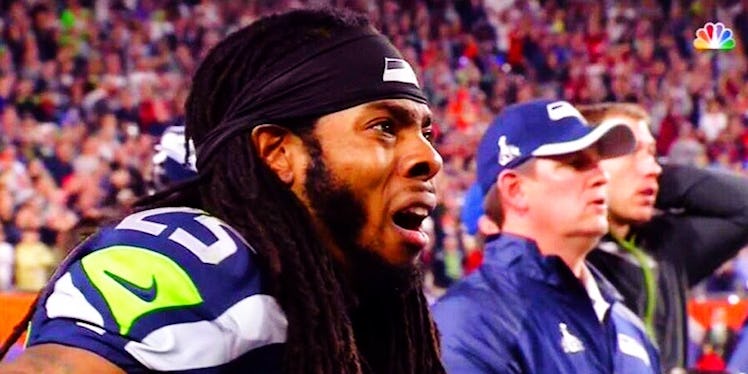
Seattle Gambled And Ended Up With A Beating They Never Saw Coming
Right about when Tom Brady and the New England Patriots lined up in the Victory Formation last night, millions of people around the world scratched their chins and wondered, "How did that just happen?"
When the Pats' Malcolm Butler intercepted Seattle quarterback Russell Wilson's pass with 26 seconds to go, football history did a 180. On a single play, an almost certain Seahawks victory became an almost certain Seahawks defeat.
It is easy to question Seattle's offensive play call on what has to be the most painful second down in franchise history. Rather than criticize the decision, allow me to say this: I understand what the Seahawks were thinking.
I don't agree with the call, which worked out about as well as the Titanic, but I get how it happened. After the game, Seattle Head Coach Pete Carroll told reporters,
We sent in our personnel, they sent in their goal-line [unit]. It was not the right matchup for us to run the football, so on second down we throw the ball to really kind of waste that play. If we score, we do, if we don't, then we run it on third and fourth down.
The immediate reaction to that strategy is this: You have Marshawn Lynch, Beast Mode. He picked up four yards on the first down; run it three more times, and he'll get in.
What Carroll's quote indicates is that the idea of an interception was nowhere on the coaches' radar. They assumed there would be a third and fourth down no matter what happened on second. The notion of their season capsizing on second down was inconceivable.
If you've ever played Texas Hold 'Em poker, there was probably a time when you had a great hand and bet all your chips thinking there was no way anybody else could beat you... and you were wrong.
In poker, there is almost always some statistical chance — however improbable — that someone else's cards can trump yours.
What often happens is you get so caught up in the moment — and your awesome full house — you fail to notice the potential straight flush waiting to seal your doom. In your mind, you can't be beat.
This is what happened to the Seahawks' coaching staff. They assumed they had three plays at the goal line. They assumed they could throw on second down and deploy Beast Mode for their final two chances.
They assumed the only two outcomes on second down were a game-winning touchdown or an incomplete pass. They assumed they had the best cards on the table, and they pushed their chips in without thinking it through.
Any poker player can explain the feeling of a "Bad Beat," when someone else's cards sucker-punch you in the face.
"Stunned" does not begin to describe it; one moment, you're preparing to harvest more chips than a Tostitos factory, and the next, you're watching helplessly as your dreams of glory become a haunting nightmare.
You start attacking yourself internally, replaying the scenario, over and over in your head, berating yourself for not sensing the danger. A Bad Beat happens in seconds, but it stays with you way longer.
The Seahawks' Bad Beat may very well torment the players and coaches for the rest of their lives. Yes, they have last year's title, but they were one Beast Mode yard away from going back-to-back.
If they had won this one, they would have joined an exclusive list of repeat champs. They would have gone down as one of the best teams in history.
In poker, the absolute best possible hand is known affectionately as "The Nuts," and in Super Bowl XLIX, Malcolm Butler had them. He came out of nowhere to pick Wilson's pass and bankrupt a dynasty. All the Seahawks had to do was gain a yard on three plays without turning the ball over, and they couldn't.
That, my friends, is why they call it gambling.